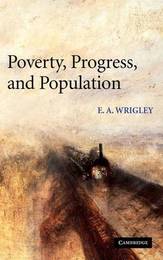
|
Poverty, Progress, and Population
Hardback
Main Details
Description
By the early nineteenth century England was very different economically from its continental neighbours. It was wealthier, growing more rapidly, more heavily urbanised, and far less dependent upon agriculture. A generation ago it was normal to attribute these differences to the 'industrial revolution' and to suppose that this was mainly the product of recent change, but no longer. Current estimates suggest only slow growth during the period from 1760-1840. This implies that the economy was much larger and more advanced by 1760 than had previously been supposed and suggests that growth in the preceding century or two must have been decisive in bringing about the 'divergence' of England. Sir E. A. Wrigley, the leading historian of industrial Britain, here examines the issues which arise in this connection from three viewpoints: economic growth; the transformation of the urban-rural balance; and demographic change in the seventeenth and eighteenth centuries.
Author Biography
Professor Sir E. A. Wrigley is Emeritus Professor of Economic History at the University of Cambridge, former Master of Corpus Christi College, Cambridge, and former President of the British Academy.
Reviews'Wrigley's reinterpretation of the eighteenth century is of vital importance for anyone wanting to understand how economic ideas were evolving in the period from the English civiil War to the Victorian age.' Times Higher Education Supplement 'The book is well written and covers a broad range of interesting topics.' Journal of Peace Research
|